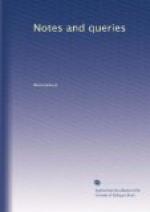C.
The Three Dukes (Vol. ii., pp. 9, 46, 91.).—Andrew Marvel thus makes mention of the outrage on the beadle in his letter to the Mayor of Hull, Feb. 28, 1671 (Works, i. 195.):—
“On Saturday night last, or rather Sunday morning, at two o’clock, some persons reported to be of great quality, together with other gentlemen, set upon the watch and killed a poor beadle, praying for his life upon his knees, with many wounds; warrants are out for apprehending some of them, but they are fled.”
I am not aware of any contemporary authority for the names of the three dukes; and a difficulty in the way of assigning them by conjecture is, that in the poem they are called “three bastard dukes.” Your correspondent C. has rightly said (p. 46.) that none of Charles II.’s bastard sons besides Monmouth would have been old enough in 1671 to be actors in such a fray. Sir Walter Scott, in his notes on Absalom and Achitophel, referring to the poem, gives the assault to Monmouth and some of his brothers; but he did so, probably, without considering dates, and on the strength of the words “three bastard dukes.”
Mr. Lister, in the passage in his Life of Clarendon referred to by Mr. Cooper (p. 91.), gives no authority for his mention of Albemarle. I should like to know if Mr. Wade has any other authority than Mr. Lister for this statement in his useful compilation.
Were it certain that three dukes were engaged in this fray, and were we not restricted to “bastards,” I should say that Monmouth, Albemarle, and Richmond (who married the beautiful Miss Stuart, and killed himself by drinking) would probably be the three culprits. As regards Albemarle, he might perhaps have been called bastard without immoderate use of libeller’s licence.
If three dukes did murder the beadle, it is strange that their names have not been gibbeted in many of the diaries and letters which we have of that period. And this is the more strange, as this assault took place just after the attack on Sir John Coventry, which Monmouth instigated, and which had created so much excitement.
The question is not in itself of much importance; but I can suggest a mode in which it may possibly be settled. Let the royal pardons of 1671 be searched in the Rolls’ Chapel, Chancery Lane. If the malefactors were pardoned by name, the three dukes may there turn up. Or if any of your readers is able to look through the Domestic Papers for February and March, 1671, in the State Paper Office, he would be likely to find there come information upon the subject.
Query. Is the doggerel poem in the State Poems Marvel’s? Several poems which are ascribed to him are as bad in versification, and, I need not say, in coarseness.
Query 2. Is there any other authority for Queen Catharine’s fondness for dancing than the following lines of the poem?




